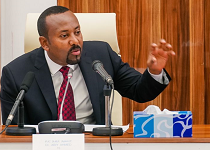During the 3rd urgent session of the House of Peoples’ Representatives (Ethiopian Parliament) meeting held early this week Ethiopia’s Prime Minister Abiy Ahmed has raised the following key points on different topics including economy, social and political affairs of the nation.
Economy: The economic progress in the last six months should be weighed in light of the operation in the North, droughts and floods the nation has been confronted with, as well as the impact of the COVID19 pandemic. Significant macroeconomic measures are required to close the budget imbalance. Banks’ net value, which was ETB 1.8 trillion six months ago, has increased by ETB 2 trillion, while stakeholders’ wealth has increased as well.
Foreign investment has surged by 23% in the last six months. The number of business licenses increased
by 10%, and 8% renewed already existing business licenses. Our systems, however, need to be upgraded
and modernized.
Inflation: The primary challenge of our nation is inflation expressed in the rising prices of food. It has a variety of causes including the impacts of COVID, increase in the cost of fertilizes, and consumer and market disparities. We need to promote family planning, take actions to prevent businesses from stocking up highly needed products and boost consumer confidence while keeping costs low.
The release of prisoners: We released the prisoners for three reasons: to bring lasting peace, taking into consideration the overall situation of the prisoners, and to consolidate our victory. In a war, there is no such thing as a total triumph.
As a result, true triumph necessitates victory in the realm of peace. This decision has greatly helped Ethiopia. We must not compromise on decisions for the lasting good of the country.
Politics – Negotiation: There has been no negotiation yet. This does not rule out the possibility of discussions. Negotiation is the upcoming all-inclusive national consultation. The Commissioners of the newly constituted National Dialogue Commission have simply been given the task of coming up with proposals; the Ethiopian people will make the final decisions. However, we should not be a country that remains at odds with the concept of consultation and dialogue.
The situation in Afar: when one part is injured, the entire country suffers. At this time, the international community has no grounds to accuse Ethiopia. It’s worth noting, though, that the attack by TPLF on Afar is an attempt to hinder humanitarian aid. To alleviate the situation, the Federal Government is working closely with the regional government of Afar.
OLF Shene: Although security forces are deployed throughout the area, Shene avoids engaging in direct combat but rather slaughters innocent people. They appear strengthened since they had found a lot of trainers and hide amongst communities. We need to approach the communities in which they are embedded, hold discussions and work out solutions.
The engagement of competing parties: It’s crucial to keep in mind that they have a say in cabinet and government decisions. Going forward, such engagement will continue extensively. The national consultation process will also help us to establish a favorable environment for further
collaboration.
Drought: Humanitarian assistance in giving access to nutritious food, nutrients, and immunizations served as a short-term remedy that prevented people from dying. Cattle have been severely harmed. Water conservation, market links, and broad cloud seeding are among the long-term alternatives.
The GERD: we want to collaborate with Egypt and Sudan. We don’t want any other option. As promised, we are generating energy and releasing water. The water from Abbay is available to all three countries. We are ready as long as there is a solution that benefits all of us.
Source – Office of the Prime Minister of Ethiopia

